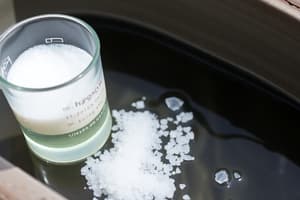Podcast
Questions and Answers
What is the purpose of the plate type heat exchanger in the cooling system?
What is the purpose of the plate type heat exchanger in the cooling system?
- To increase the pressure of the water
- To remove excess heat from the water (correct)
- To maintain the temperature of freshwater
- To filter the seawater before use
Which circuit is used for low-temperature zone machinery?
Which circuit is used for low-temperature zone machinery?
- Seawater cooling circuit
- High-temperature circuit
- Low-temperature circuit (correct)
- Primary circulation circuit
What maintains the balance between low-temperature and high-temperature freshwater systems?
What maintains the balance between low-temperature and high-temperature freshwater systems?
- Freshwater generator
- Chemical additives
- Expansion tank (correct)
- Electrical pumps
What is the most abundant dissolved solid in seawater?
What is the most abundant dissolved solid in seawater?
What is one of the components of the high-temperature circuit?
What is one of the components of the high-temperature circuit?
How is the quality of water in the cooling system maintained?
How is the quality of water in the cooling system maintained?
What is the primary purpose of the marine engine cooling water system?
What is the primary purpose of the marine engine cooling water system?
What system refills the expansion tank for low and high-temperature circuits?
What system refills the expansion tank for low and high-temperature circuits?
Which ion constitutes the largest percentage of solids present in seawater?
Which ion constitutes the largest percentage of solids present in seawater?
How much magnesium sulfate is found in one kilogram of seawater?
How much magnesium sulfate is found in one kilogram of seawater?
What typically circulates the HT cooling water system?
What typically circulates the HT cooling water system?
What role does cooling water play in maintaining engine metals?
What role does cooling water play in maintaining engine metals?
What is a critical parameter to monitor to ensure cost-effective operation?
What is a critical parameter to monitor to ensure cost-effective operation?
What percentage of total dissolved solids in seawater does magnesium chloride represent?
What percentage of total dissolved solids in seawater does magnesium chloride represent?
Which of the following salts is present in the largest amount in a freshwater sample?
Which of the following salts is present in the largest amount in a freshwater sample?
What is the primary cause of engine components overheating?
What is the primary cause of engine components overheating?
What is the primary quality required for cooling water in an engine?
What is the primary quality required for cooling water in an engine?
Why is untreated distilled water considered corrosive?
Why is untreated distilled water considered corrosive?
Which of the following is NOT a form of corrosion that can occur in cooling water systems?
Which of the following is NOT a form of corrosion that can occur in cooling water systems?
What can result from the products of corrosion in a cooling system?
What can result from the products of corrosion in a cooling system?
What is the recommendation if distilled water is not available for cooling?
What is the recommendation if distilled water is not available for cooling?
What materials can contribute to scale formation in cooling systems?
What materials can contribute to scale formation in cooling systems?
Which of the following cooling water sources is highly corrosive and not recommended?
Which of the following cooling water sources is highly corrosive and not recommended?
Which of the following is a key reason for adding a corrosion inhibitor to distilled water used as cooling water?
Which of the following is a key reason for adding a corrosion inhibitor to distilled water used as cooling water?
What is the main purpose of using zinc in pipework?
What is the main purpose of using zinc in pipework?
What temperature range poses the highest risk of corrosion for zinc?
What temperature range poses the highest risk of corrosion for zinc?
Why is galvanized piping not recommended for diesel cooling systems?
Why is galvanized piping not recommended for diesel cooling systems?
Which of the following is a property of sodium borate when used in cooling water treatment?
Which of the following is a property of sodium borate when used in cooling water treatment?
Which corrosion inhibitor is specifically noted for its protective qualities for aluminum?
Which corrosion inhibitor is specifically noted for its protective qualities for aluminum?
What is the recommended dosage range for sodium benzoate in diesel cooling water treatment?
What is the recommended dosage range for sodium benzoate in diesel cooling water treatment?
What effect does a higher concentration of chlorides or sulfates have on corrosion inhibitors?
What effect does a higher concentration of chlorides or sulfates have on corrosion inhibitors?
What type of metal is sodium chromate protective for in diesel cooling water systems?
What type of metal is sodium chromate protective for in diesel cooling water systems?
What is the first step to take if abnormal deposits or rust are detected in the cooling water system?
What is the first step to take if abnormal deposits or rust are detected in the cooling water system?
Which procedures are included in the cleaning of the cooling water system?
Which procedures are included in the cleaning of the cooling water system?
Who should ideally perform the cleaning of the cooling water system?
Who should ideally perform the cleaning of the cooling water system?
What should be done with the cooling water after the cleaning process?
What should be done with the cooling water after the cleaning process?
What is a potential hazard related to the cleaning chemicals used in the cooling water system?
What is a potential hazard related to the cleaning chemicals used in the cooling water system?
What is an essential guideline to follow when cleaning the cooling water system?
What is an essential guideline to follow when cleaning the cooling water system?
What is an inappropriate reaction if rust or deposits are found in the cooling water system?
What is an inappropriate reaction if rust or deposits are found in the cooling water system?
What is a critical aspect of cleaning the cooling water system?
What is a critical aspect of cleaning the cooling water system?
Flashcards are hidden until you start studying
Study Notes
Composition of Seawater
- Sodium chloride (NaCl) accounts for 79% of total dissolved solids, with a concentration of 25,000 PPM.
- Magnesium chloride (MgCl2) contributes 10%, equating to 3,000 PPM.
- Other significant salts include magnesium sulfate (MgSO4) at 6% (2,000 PPM), calcium sulfate (CaSO4) at 4% (1,200 PPM), and calcium bicarbonate (Ca(HCO3)2) at less than 1% (200 PPM).
- Salts in 1 kilogram of seawater:
- Sodium chloride - 27.21 gm
- Magnesium chloride - 3.81 gm
- Magnesium sulfate - 1.66 gm
- Calcium sulfate - 1.26 gm
- Potassium sulfate - 0.8 gm
- Calcium carbonate - 0.12 gm
- Magnesium bromide - 0.08 gm
Freshwater Sample Analysis
- Concentration of salts in freshwater:
- Sodium chloride (NaCl) - 50 PPM
- Sodium nitrate (NaNO3) - 35 PPM
- Magnesium sulfate (MgSO4) - 30 PPM
- Calcium sulfate (CaSO4) - 90 PPM
- Calcium carbonate (CaCO3) - 200 PPM
Major Ions in Seawater
- Chloride (Cl-) - 55.03%
- Sodium (Na+) - 30.59%
- Sulfate (SO4-2) - 7.68%
- Magnesium (Mg+2) - 3.68%
- Calcium (Ca+2) - 1.18%
- Potassium (K+) - 1.11%
Marine Engine Cooling Water
- The cooling system is essential for removing excess heat from ship engines and machinery.
- A cooling liquid circulates within the engine, absorbing heat and passing through a heat exchanger for cooling with seawater.
- Freshwater is utilized to cool engine parts and is stored in a tank before cycling through a plate-type heat exchanger.
Low-Temperature and High-Temperature Circuits
- Low-Temperature Circuit (L.T):
- Used for low-temperature equipment and connected to the seawater cooler.
- Maintained balance with the high-temperature circuit via a common expansion tank.
- High-Temperature Circuit (H.T):
- Comprises the main engine's jacket water system, operating at high temperatures.
- Maintained by circulating low-temperature freshwater.
Chemical Properties of Engine Cooling Water
- Regular chemical addition is essential to prevent corrosive conditions.
- Critical parameters for monitoring: pH, hardness, conductivity, turbidity, phosphates, sulfates, ammonium, chlorides, calcium, magnesium, aluminum, iron, zinc, silicate, nitrate, nitrite, chemical oxygen demand, total organic carbon.
Quality Requirements for Cooling Water
- Use demineralized (distilled) water for effective cooling and to prevent corrosion; corrosion inhibitors are critical due to the corrosive nature of untreated distilled water.
- Tap water and rainwater are generally unsuitable; sea water is strictly prohibited due to high corrosion risks.
Corrosion and Scale Concerns
- Corrosion can lead to severe issues such as pitting and scale formation, impacting heat transfer and cooling efficiency.
- Scale consists of hard deposits formed from minerals and requires regular management.
Chemicals for Cooling Water Treatment
- Sodium Nitrite: Corrosion inhibitor; dosage 1000 to 3000 PPM, protective to cast iron, steel, and aluminum.
- Sodium Benzoate: Protective to steel and solder; dosage 10,000 to 15,000 PPM.
- Sodium Borate: Buffers at pH 8.9; also a fungicide; dosage with other inhibitors 1000 to 3000 PPM.
- Sodium Chromate: Effective for all pipes and alloys; dosage 1000 to 3000 PPM.
Cleaning Protocol for Cooling Water Systems
- Abnormal deposits necessitate thorough cleaning, including degreasing and descaling.
- Water testing is vital to determine the necessary concentration of inhibitors for effective operation.
Studying That Suits You
Use AI to generate personalized quizzes and flashcards to suit your learning preferences.





